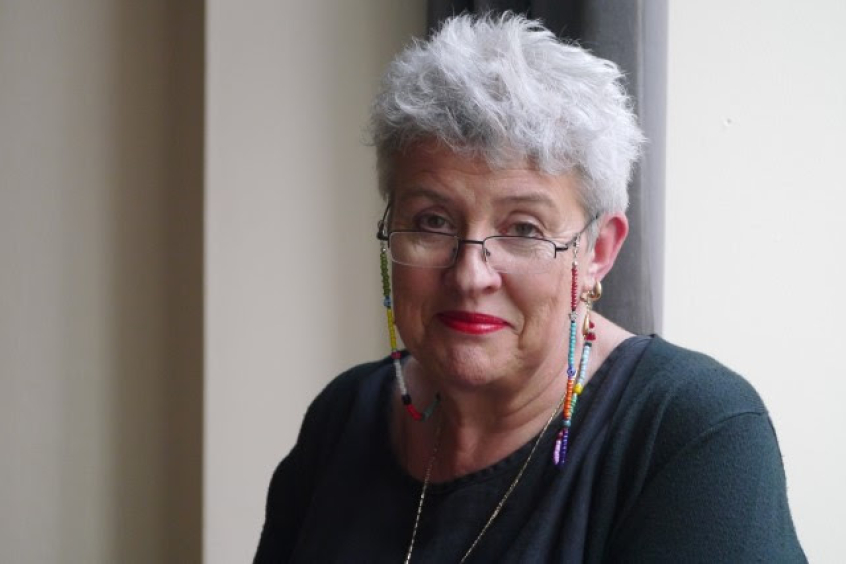Lucy Berry, a performance poet and United Reformed Church (URC) minister, has been named as the first poet-in-residence for the Joint Public Issues Team (JPIT) of the Baptist Union of Great Britain, the Church of Scotland, the Methodist Church and the URC.
She's a subtle observer of life and Christian life, able in a few lines of verse to reveal the pressure point where faith meets hypocrisy, or to nail a profound truth with a single striking image. Accessibility – she spent four years with Radio 2's Jeremy Vine show – does not mean triviality.
JPIT's remit is to act as its churches' voice on issues ranging from gambling to housing via taxation and nuclear weapons. Lucy attended one of its conferences, invited there to reflect and offer feedback in verse. 'I ended up, during the course of the day, very taken both by the people who set it up, and the people who attended and contributed,' she tells me. 'They were all "doers" in one way or another. Lovely; I like active faith.'

I have a niggling doubt, though, about the enterprise. I wonder if she'll be writing poems about the iniquities of the government's housing policy, and just how poetical she'll be able to be. How can you write poems that are good poetry, but still pack a punch in terms of expressing something about 'issues'? I try her with John Keats, who said, 'We hate poetry that has a palpable design upon us.'
It's not exactly a slap-down, but: 'You're assuming he's right. All poems have a "palpable design", even if it's not conscious. In the process of writing, a poet may be sorting things out between different aspects of her/himself – or finding a position alongside, or against, an existing assumption – or merely wanting to share/reveal something the poet finds important or touching.
'Think of a few: Charles Causely's Timothy Winters is, among other things, sharing the poet's despair about child poverty. John Betjeman's Slough shares, amongst other things, the poet's fear-filled contempt for mediocrity ['Come, friendly bombs, and fall on Slough...]; Matthew Arnold, in Dover Beach, is expressing his deep sadness at what he believes to be Christian faith in atrophy.
'I don't think my brief is to pack a punch, although I sometimes want to. It's about sharing a personal view on a JPIT issue. My poems won't be trying to express what JPIT thinks; just speaking alongside. God only knows if they'll be good.'
And what counts as a good poem?
'To be good, it would have to be emotional not sentimental, personal not general, witness not theory.'
I ask if she has a favourite, among the ones she's written. 'There's one about addiction which I rate. And one about lies. They're pretty nasty. But not overstated or tricksy. They make people cry. So probably they're rather true.'
This is another hallmark of her writing: it has an edge to it that's continually unexpected. One she tweeted recently is about the rose-ringed parakeets that infest parts of London today – beautiful, exotic birds that allegedly, though improbably, escaped from the set of The African Queen, filmed at Isleworth Studios in 1951. How strange it must have been for these immigrant creatures with their bright colours in a grey land, she reflects – and closes with the killer lines, 'At what point do you listen to a song/ sung in a different accent and decide/ whether they do – or never shall – belong?'
Thinking of that edge, I ask her what makes her angry at the moment.
'Too many things to list here. If I have grandchildren one day, they will all be brown – so racism infuriates me personally as well as intellectually. But all my many furies fall under the general headings of individual or institutional pettiness, bullying, sulking, intimidation, dishonesty, squeamishness. Oh, and denial! One of the ex-archbishops of Canterbury defined Evil as "the denial of what is". I'd buy that.'
As well as being a poet, Lucy is a United Reformed Church minister. I'm curious about the way she reads the Bible, and how poetry affects it.
'It's more the other way round: the Bible affects everything I write,' she says. 'My poems are full of Bible, even when it's not mentioned. I love the Bible deeply. Perhaps, being a poet, I hear and read it slightly differently. At one level I consider the whole Bible as poetry (not poems). It asks itself questions, which it answers, contradicts, echoes, rejects, repeats, denies, threatens...'
Back to JPIT: it's the churches' campaigning arm, aimed at challenging injustices and righting wrongs. I try her with another poet on poetry – WH Auden, who wrote that 'poetry makes nothing happen'. True or false?
'Um. To my mind, false. Poems and poetic songs allow like-minds an emotional gathering place. That can be dynamic. I know that, for example, I Rise, by Maya Angelou, has inspired a lot of women of colour to walk taller. Is that a happening? I think so.'
To watch her reading her poem 'An Empire and a Village', click here. Her own website is here.













